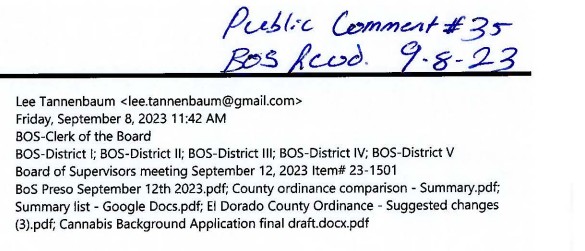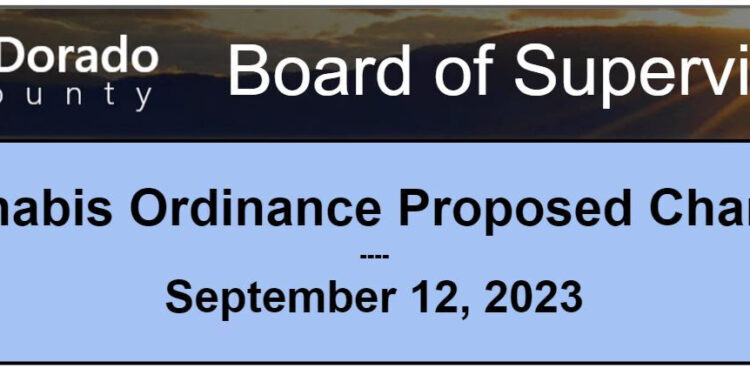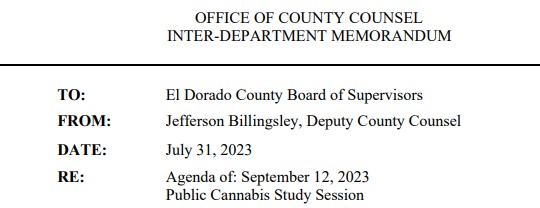(InEDC) BY El Dorado County Board of Supervisors Published: September 8, 2023
County Counsel, and the Planning and Building Department, Commercial Cannabis Division, recommending the Board provide direction to staff on:
- Whether the Board supports changes to the County’s existing cannabis ordinances; and,
- If changes are supported, direct a Resolution of Intent reflecting the Board’s guidance be prepared to start the ordinance amendment process.
RE:
Item Number – 5. 23-1501 County Counsel and the Planning and Building Department, Commercial Cannabis Division, recommending the Board:
1) Provide direction on changes to the County’s existing cannabis ordinances; and
2) If changes are supported, direct staff to return to the Board with a Resolution of Intent reflecting the Board’s guidance to start the ordinance amendment process.
County Counsel Memo
Policy Areas/Themes
1. Should the setbacks of the cannabis ordinance be reevaluated?
Setback issues arise in two areas of cannabis regulation. For cultivation sites, the regulations require a setback of 800 feet from a property line. For all cannabis businesses, setbacks of 1500 feet from a list of designated sensitive community receptors, measured property line to property line, are required. As the Planning Commission discussed, waivers and approval of lesser setbacks are available to applicants that owned their property prior to November 6, 2018, if the lesser setback can meet the purposes of the regulations. The Planning Commission discussion revolved around whether lesser setbacks should be considered or if the current “grandfathered” waiver process should be available to all applicants regardless of when the property was purchased.
The Planning Commission unanimously (5-0) agreed to recommend that this policy question be considered by your Board. The Commissioners noted that a review of the setbacks makes sense as the County begins to experience actual (instead of merely hypothetical) legal cannabis operations.
2. Should expanded cannabis canopy limits be considered?
Another theme from the cannabis industry was a desire to have an allowance for larger grow area (canopy) for each of the allowed cultivation zones. A consistent comment was that the canopy limits did not appear to be tied to any particular policy rationale. A related but discrete item is an industry desire to defer to the state definition of “premises” as opposed to our current language which defines the premises as a single legal parcel.
The Planning Commission contemplated whether there is a policy rationale for the existing canopy limits assuming expanded cultivation areas would not otherwise negatively affect neighboring parcels. The Commission members unanimously agreed that this policy question should go to your Board for consideration.
3. Should changes to propagation rules be considered?
Advocates requested an allowance be made for a “scaled” propagation that allows a designated and proportional percentage of the grow area to be used for indoor propagation activities. Staff takes no issue with a portion of the approved cultivation area being used for indoor propagation, but this would require changes to the current code regarding the use of indoor facilities where outdoor cultivation is allowed.
The Planning Commission members unanimously agreed that this policy question should be recommended for consideration by your Board.
4. Should expanded uses be considered on agricultural cultivation sites?
Under the current regulations, most manufacturing and processing activities are not allowed on the cultivation parcel and must take place off site. Advocates would like to see increased integration to allow for other cannabis related activities on the same parcel as the cultivation. Currently lower intensity manufacturing uses (Type N-infusion and Type P-packaging and labeling licenses) are allowed within Commercial and Agricultural zones. Typically, manufacturing uses that have the potential to create nuisances to sensitive receptors are confined to Industrial and Commercial zones.
The Planning Commission voted to recommend this discussion item with an expressed limitation as to only nonvolatile processing activities that are similar to what would be allowed for traditional agricultural activities should be considered. The vote on this recommendation was 4/1 with Commissioner Vegna voting no.
5. Should any aspects of Ranch Marketing be available to cannabis cultivators?
There was a general discussion of treating cannabis more akin to an agricultural crop or product for purposes of the County’s Right to Farm and the Ranch Marketing and Winery Ordinances. Ranch Marketing authorizes certain commercial activities on agricultural parcels, including holding special events and onsite sales and consumption subject to a compatibility review. State law authorizes the Department of Cannabis Control to issue a temporary event license to allow a temporary cannabis event where the onsite sale and consumption of cannabis goods is authorized. Your Board recently adopted Ordinance No. 5177 that made various changes to the Winery Ordinance and the Ranch Marketing Ordinance. The voter initiative and current language of our cannabis ordinance prohibits cannabis from being treated as an agricultural crop or product for purposes of Right to Farm, the establishment of Agricultural Preserves, or any other provision of our code that defines or allows cultivation of crops or agricultural products.
While cannabis is not considered an agricultural product under state law for purposes of our local zoning laws, and its classification as a Schedule I drug under federal law prohibits purely agricultural treatment, comments revolved around whether any of the ranch marketing activities available to wineries, orchards, and other traditional agricultural crops should be available to cannabis cultivators.
The Commission voted to not recommend that your Board consider ordinance changes to make Ranch Marketing opportunities available to the cannabis industry. The vote on this recommendation was 3/2 with Commissioners Harkin and Boeger voting no (they would recommend changes in this area).
6. Should policy changes that involve the Sheriff’s Office be considered?
The Grower’s Alliance suggested several revisions to cannabis regulations that directly or indirectly involve responsibilities of the Sheriff’s Office. As a general matter, changes to make the El Dorado County background check process similar (or to defer) to the state’s criteria were requested.
The voter initiatives and our current ordinance describe the process and criteria by which the Sheriff’s Office conducts backgrounds checks. This process has additional requirements and in general is more stringent than the state licensing requirements. There is no legal impediment to this “dual track” approach; indeed, it is contemplated by state law.
Similarly, requests were made to have the definition of “owner” changed to mirror state law.
Such a change would impact the scope of the parties involved with a cannabis business that would be required to undergo a local background check. In a somewhat related matter, there was also a request to loosen the availability requirements for the designated local contact for cannabis businesses.
Recognizing that law enforcement topics are beyond the subject matter expertise of the Planning Commission, the Commission unanimously voted to defer contemplation of these issues and to forward consideration of these issues on to your Board without a recommendation. The Commission further recommended that the Sherriff’s Office be requested to provide feedback for your Board’s consideration.
The Sheriff’s Office has provided a written response on these policy changes (Exhibit B) and will be provided notice of this study session and an invitation to comment as recommended by the Planning Commission.
7. Should recommendations be made on other general policy considerations?
A. Tax Structure/Rates: The voter approved ballot initiative approved taxation rates for commercial cannabis cultivation based upon either canopy square footage (currently used) or gross receipts as defined in the Revenue and Taxation Code. The initiative authorized the Board to set the rates based on either taxation method within the designated ranges of Measure N. County Counsel’s office has spoken to the Treasurer Tax Collector for the perspective of her office. The Treasurer Tax Collector is not opposed to your Board considering a change from the canopy square footage structure to one based on gross receipts. A gross receipts tax is easier to document, audit, and verify from a staff perspective and has worked well for other cannabis businesses in the County (such as retailers). From the Treasurer Tax Collector’s perspective, gross receipts are generally easier to administer than the square footage structure which can entail a more detailed and staff intensive verification process. The Planning Commission unanimously voted to pass on a recommendation that the BOS consider a change to the tax structure and that your Board consider a discussion of existing cannabis tax rates in light of current market conditions and actions taken by the State on cannabis taxation issues. Your Board has discretion to set cannabis tax rates within the ranges of Measure N; a higher rate would require voter approval.
B. Countywide EIR: Advocates requested preparation of a countywide cannabis environmental impact report. The concern is that environmental review for individual cannabis projects is a barrier to market entry. This is a policy and a budgetary and resource issue for your Board to consider.
The PC unanimously recommended this item for consideration by your Board with three caveats: 1) that there are available resources (both fiscal and staff) to consider the item; 2) that any supplemental document be fully funded by the industry; and 3) that individual site review remain part of the CCUP process.
In a related environmental issue, similar budgetary and resource issues will have to be considered when contemplating potential changes to the County’s existing cannabis ordinance as a result of this study session. Prior changes to the County’s ordinance were processed under a CEQA statutory exemption for local cannabis regulations which has now sunset. Some of the policy considerations from the Planning Commission (particularly items 1-5) would require further environmental review as part of the ordinance revision process as they could potentially expand environmental impacts of cannabis cultivation.
8. Is there a recommendation on issues of staff agreement?
During the study session some procedural changes to streamline the permitting process were discussed. These did not impact policy issues and were procedural clarifications staff generally agreed were helpful:
A. The annual operating permit should issue when the conditions of approval for the Cannabis Conditional Use Permit (CCUP) are met, not upon the date of approval of the CCUP. With this change the annual permit would more realistically coincide with when business operations commence, not with the approval of the CCUP which typically requires lead time for the various conditions to be fulfilled prior to the actual start of operations.
B. The renewal of an annual operating permit should not require a resubmission of all the original application materials, just items that have changed. Staff does not require review of materials previously filed and reviewed, only a review of changed items or new conditions for compliance with the regulations.
The PC unanimously recommended these process items for consideration by your Board.
2. B – Sheriff’s Office Memo,

July 17, 2023
Dear Members of the Planning commission:
I am writing in response to the questions presented by the Commission to the Sheriff’s Office regarding some of the proposed changes to the County’s commercial cannabis ordinance proffered during the June 8th study session.
Before turning to specifics, I wanted to state that the actions of the Sheriff’s Office with respect to commercial cannabis permitting have been and will continue to be based on the ordinance as written, whether it remains in its current form or is amended in the future. The Sheriff’s Office does not have authority to deviate from the requirements of the ordinance. Whatever opinions may be expressed below, it is ultimately up to the discretion of the Board of Supervisors whether to amend the ordinance. The Sheriff’s Office will make its best efforts to comply with whatever amendments may be enacted by the Board.
With respect to the proposed changes to the background check process, principally the proposed 45-day limit within which to make a recommendation, please note that delays in the background check process are generally extrinsic to the Sheriff’s Office. Frequently, the Sheriff’s Office has timely requested information from applicants and other jurisdictions, only to have to follow up multiple times to obtain the necessary information. Imposing a time limit on the Sheriff’s Office will not solve this problem, and will only result in recommendations to deny based upon lack of information. Further, there are numerous components to obtaining a commercial cannabis permit outside of the background check. In the Sheriff’s Office experience, it has generally provided a background check recommendation well in advance of an applicant’s completion of the other requirements. Frankly, this proposal appears to be a solution to a problem that does not actually exist.
The Commission also asked for a response to the proposed revision to the definition of “owner.” The proposal would adopt the Bureau of Cannabis Control’s definition of “owner,” which is materially similar to the existing definition except for the addition of a twenty percent aggregate ownership threshold. The Sheriff’s Office does not take a stance on the adoption of a minimum ownership threshold. However, please note that any owner, regardless of the amount of interest, will need to have a background check performed if he or she will serve as a Designated Local Contact. Spouses of qualifying owners should also continue to have background checks performed. California is a community property state, and dishonest applicants who know they cannot pass a background check may choose to put a spouse’s name on the application instead of themselves to avoid discovery of their prior offenses. Requiring all spouses to get the background check prevents this deception from being effective.
The Sheriff’s Office also believes that Designated Local Contacts (DLCs) should also continue to be subject to background checks. The DLCs are the businesses’ primary interface for the Sheriff’s Office. Deputies may be required to collaborate with DLCs at grow sites, and the Sheriffs Office firmly believes that conducting background checks for DLCs is a critical step in ensuring both public and officer safety.
As for the 24/7 availability of the DLCs, the Sheriff’s Office would like to note that more than one DLC may be listed for a business. The Sheriff’s Office will go down the contact list whenever an issue arises until it gets a response from one of DLCs. It is not an issue for any DLC to be on vacation or otherwise unavailable so long as there is another listed contact available. Businesses are welcome to have their DLCs coordinate among themselves to determine coverage. The Sheriff’s Office believes the concern expressed with respect to 24/7 coverage is based on a misreading of the general obligation — it is a business-wide obligation, rather than an individual obligation.
Please let us know if you have any additional questions on this topic.
Sincerely, Jeff Leikauf Sheriff — Coroner Public Administrator.

3. C – Cannabis Workshop Response,
Planning and Building Department Response
For the policy areas/themes outlined in Attachment A, Planning and Building has provided the following information for additional consideration. Several of these policy areas involve various Departments and divisions. Therefore, it is difficult for Planning and Building staff to make specific recommendations. At a minimum, staff has provided information on the impact to resources (primarily staffing or budgetary) that should be considered.
1. Should the setbacks of the cannabis ordinance be reevaluated?
Allowing a lesser setback if the lesser setback can meet the purposes of the regulations could potentially impact staff resources. The change in how the setback is applied could increase the number of sites where cannabis could be grown. Setbacks based on property lines are easily measured and verified. Setbacks based on other factors may be more difficult to measure and monitor over time. For example, if a setback is based on the operational area of a cannabis grow, the perimeter of the grow area may change over time and may need to be re‐evaluated.
As noted in Attachment A, budgetary and resource issues will have to be considered when contemplating this potential change. Prior changes to the County’s ordinance were processed under a CEQA statutory exemption for local cannabis regulations which has now sunset. This policy consideration would require further environmental review as part of the ordinance revision process as it could potentially expand environmental impacts of cannabis cultivation.
2. Should expanded cannabis canopy limits be considered?
As outdoor commercial cannabis sites are just beginning to be permitted, Planning and Building staff do not have enough local data to analyze canopy areas and affects on neighboring parcels. Staff could research other jurisdictions, compare allowable canopy areas and effects on neighboring parcels. This research would require additional staff resources.
As noted in Attachment A, budgetary and resource issues will have to be considered when contemplating this potential change. Prior changes to the County’s ordinance were processed under a CEQA statutory exemption for local cannabis regulations which has now sunset. This policy consideration would require further environmental review as part of the ordinance revision process as it could potentially expand environmental impacts of cannabis cultivation.
3. Should changes to propagation rules be considered?
There is no impact to staff resources if a portion of the approved cultivation areas is used for indoor propagation activities.
As noted in Attachment A, budgetary and resource issues will have to be considered when contemplating this potential change. Prior changes to the County’s ordinance were processed under a CEQA statutory exemption for local cannabis regulations which has now sunset. This policy consideration would require further environmental review as part of the ordinance revision process as it could potentially expand environmental impacts of cannabis cultivation.
4. Should expanded uses be considered on agricultural cultivation sites?
As outdoor commercial cannabis sites are just beginning to be permitted, Planning and Building staff do not have enough local data to analyze the effect of current or potentially expanded uses on surrounding areas or sensitive receptors.
As noted in Attachment A, budgetary and resource issues will have to be considered when contemplating this potential change. Prior changes to the County’s ordinance were processed under a CEQA statutory exemption for local cannabis regulations which has now sunset. This policy consideration would require further environmental review as part of the ordinance revision process as it could potentially expand environmental impacts of cannabis cultivation.
5. Should any aspects of Ranch Marketing be available to cannabis cultivators?
Planning and Building staff agree with the Commission not to recommend changes to make Ranch Marketing opportunities available to the cannabis industry. The recent changes to the Ranch Marketing ordinance are in the process of being implemented and require additional resources from the Department of Agriculture and Code Enforcement. Additional Code Enforcement staff were recently approved to help enforce both Vacation Home Rental and Ranch Marketing activities however it will be at least a few months before staff is hired. It is anticipated that even with the new code enforcement staff, they may not be able to address all Ranch Marketing and VHR calls due to the large geographic area to be covered and the time necessary to document violations. Expanding the scope of Ranch Marketing at this time is not recommended.
As noted in Attachment A, budgetary and resource issues will have to be considered when contemplating this potential change. Prior changes to the County’s ordinance were processed under a CEQA statutory exemption for local cannabis regulations which has now sunset. This policy consideration would require further environmental review as part of the ordinance revision process as it could potentially expand environmental impacts of cannabis cultivation.
6. Should policy changes that involve the Sheriff’s Office be considered?
The policy changes involving the Sheriff’s Office do not directly impact Planning and Building’s role in processing commercial cannabis permits. Because of the close working relationship between the Sheriff’s Office and Planning and Building/Cannabis staff, we support recommendations that assist the Sheriff’s Office in the timely processing of permits and provide them the information necessary for their enforcement obligations.
7. Should recommendations be made on other general policy considerations?
The current voter approved ballot initiative provided the option for taxation rates based on either canopy square footage (currently used) or gross receipts. The tax structure does not directly affect Planning and Building staff and because outdoor commercial cannabis sites are just beginning to be permitted, Planning and Building staff do not have enough local data to analyze the difference between the two options. If further analysis is desired, staff could prepare data comparisons based on hypothetical scenarios.
b. Countywide EIR – Planning and Building staff do not recommend a Countywide EIR due to impacts on staff resources. The County would be the lead agency in an EIR and even if a consultant was hired, Planning staff would be necessary to manage the contract, meet and confer with the consultants, provide information and data and review draft documents.
8. Is there a recommendation on issues of staff agreement?
a. Annual operating permit ‐ Planning and Building staff support issuance of the annual operating permit at the time the conditions of approval for the Cannabis Conditional Use Permit (CCUP) are met. This will not have any impact on staff resources.
b. Renewal of annual operating permit & resubmission of materials ‐ Planning and Building staff support applicants only providing any new or modified application materials at the time of permit renewal and not resubmitting the entire application package.
c. Agricultural Commission review – Currently all cultivation applications are required to be reviewed by the Agricultural Commission. The Commission has expressed interest in revising the policy to be consistent with General Plan Policy 8.1.4.1 conforming with the review of all other discretionary project types.

4. Public Comment BOS Rcvd. 9-8-2023
From: Lee Tannenbaum <lee.tannenbaum@gmail.com>
Sent: Friday, September 8, 2023 11 :42 AM
To: BOS-Clerk of the Board
Attachment: [17 Mg Slideshow Graphic File]
1) This will be our presentation during our 30 minute (hope to not take 30 minutes) time slot. I will plan on talking to each of the slides.
2) County Ordinance Comparision (sic) – This is sheet which does a county by county comparison of many of the differences between EDC and other counties. This data comes from CA DCC and from the reading of all other counties ordinances. These were fact checked for the PC meetings held, by staff and the PC.
3) Summary list-This is a summary of the proposed changes. While there are many, they correspond directly to the staff letter attached to this agenda item.
4) EDC Ordinance – This is a red lined county ordinance that was provided to staff and the PC and was discussed in its entirety with the attendees and EDSO of the 2 PC sessions previously held.
5) Cannabis Background Check – This is the actual background check document required to be completed for applicants from EDSO. This is attached for your review to illustrate the 5th amendment violations in this document and why we suggest it be changed to eliminate these violations.
General notes.
Staff did an excellent job summarizing all items discussed during the PC sessions. What is missing are much of the detail which I have included in the presentation. These details are important in this discussion as they all fall into the broader picture of what staff presented.
The point I am trying to make above, is the amount of work required by staff to make these changes should be minimal, as all items contained in these summaries was discussed at the PC sessions and were tentatively approved by the PC. Please understand that it is not the intent of the Alliance to grossly change the existing ordinance. Nor do we want to grossly change what the voters voted for. We are suggesting many minor changes which will allow for a faster and less costly way for applicants to become legal members of the community. We do believe that the voters intended for this program to be workable and eliminate much of the illegal activity surrounding cannabis in this county, which is not currently the case. In 5 years since legalization, one new cannabis cultivation business is operational, one was just approved and another is now in the appeals process.
While there is a lot of data, it is critical to understand it at a high level as you make your decision whether or not to send this back to staff with a Resolution of Intent.
Thank you for your consideration and I look forward to seeing you all next week.
Lee Tannenbaum
CEO Cybele Holdings, Inc.
President El Dorado County Growers Alliance
650.515.2484
Related files: 23-1032
Documents and details are posted on Legistar No. 23-1501 here:
https://eldorado.legistar.com/gateway.aspx?m=l&id=/matter.aspx?key=34727
Full agenda can be downloaded at: https://eldorado.legistar.com/View.ashx?M=A&ID=1113768&GUID=C2EAA8D7-38EB-4453-97B0-88291E6A494E
Any written correspondence should be directed to the County of El Dorado Board of Supervisors, 330 Fair Lane, Placerville, CA 95667 or via email: edc.cob@edcgov.us
Please submit your comment via email by 4:00 p.m. on September 11 to the Board meeting. Your comment will be placed into the public record and forwarded to the Board of Supervisors.











